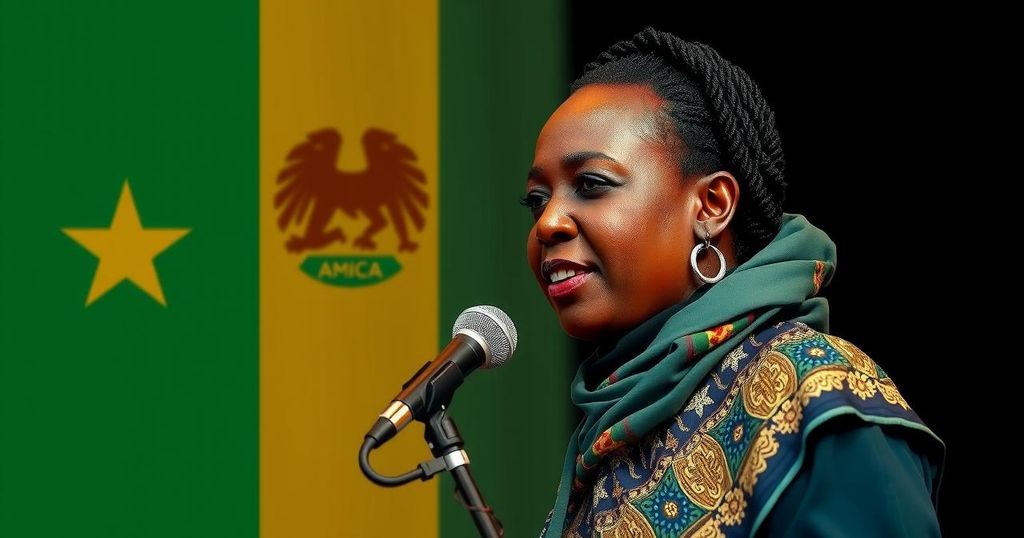Namibia may elect its first female president, Netumbo Nandi-Ndaitwah, in upcoming elections, with 1.4 million registered voters participating. SWAPO, her party, has led Namibia since independence but faced setbacks in 2019. Analysts highlight the need to engage younger voters who prioritize governance over historical ties. Nandi-Ndaitwah promises to address youth unemployment and women’s rights, competing against other political parties in a changing regional landscape.
Namibia stands on the brink of a historic election that could see Vice President Netumbo Nandi-Ndaitwah becoming the nation’s first female president. The elections, taking place on Wednesday, have drawn approximately 1.4 million registered voters, with 15 political parties vying for the presidency and seats in the National Assembly. According to early polling results, Nandi-Ndaitwah and her party, the South West Africa People’s Organization (SWAPO), are currently leading. SWAPO has governed Namibia since its independence from South African apartheid in 1990; however, the party suffered a significant political setback in 2019 by losing its two-thirds majority in the National Assembly for the first time since 1994, a situation attributed to corruption allegations within the fishing industry.
Political analyst Henning Melber emphasizes that while SWAPO appears favored to win, the results from 2019 serve as a warning. He asserts that the party must engage younger voters who may not connect with the historical narrative of liberation struggles. Melber noted, “It looks like there is no way back to regain such dominance. The process of erosion of legitimacy as a former liberation movement has advanced too much.” This generation of voters, termed ‘born-frees’, will prioritize the quality of governance over emotive ties to the party’s past.
Nandi-Ndaitwah, aged 72, has outlined ambitious plans to combat a 20% unemployment rate among youths, promising an investment of about 85 billion Namibian dollars to create over 500,000 jobs. Although critics regard these goals as overly ambitious, issues such as women’s rights, pay equity, and healthcare are pressing matters that voters will likely consider. Should Nandi-Ndaitwah be successful in her bid, she would join the ranks of notable female leaders in Africa, including Liberia’s Ellen Johnson Sirleaf, Malawi’s Joyce Banda, and Samba Pranza from the Central African Republic.
Political science lecturer Erika Thomas emphasizes that Nandi-Ndaitwah must demonstrate transparency, independence, and accountability if elected. She should advocate for women’s representation in political frameworks and ensure robust policies for female participation in governance. Nandi-Ndaitwah’s presidency would face competition from parties such as the Independent Patriots for Change and the Affirmative Repositioning party, led by figures such as former dentist Panduleni Itula and Job Amupanda.
Amid significant electoral shifts throughout southern Africa this year, Namibia’s election presents not only a chance for change but also reflects a broader trend of political evolution in the region. As SWAPO concludes its campaign leading into the elections, the result could reverberate across southern Africa’s dynamic political landscape.
The article focuses on Namibia’s upcoming presidential election, highlighting the potential for the country to elect its first female president, Netumbo Nandi-Ndaitwah. This election marks a significant moment in Namibia’s political history, as it occurs against a backdrop of recent challenges faced by SWAPO, the ruling party that has been in power since the nation gained independence. The article also discusses the changing political dynamics, particularly among younger voters, and juxtaposes Nandi-Ndaitwah’s leadership aspirations with her party’s past electoral weaknesses.
In summary, Namibia is poised to potentially elect its first female president through Vice President Netumbo Nandi-Ndaitwah, following her party’s significant political challenges in past elections. Her plans to tackle unemployment and advocate for women’s rights are central to her campaign, while broader shifts in political allegiances within the region may influence the outcomes of this election. Voter perceptions and demands will be pivotal in determining the future leadership of Namibia.
Original Source: abcnews.go.com







